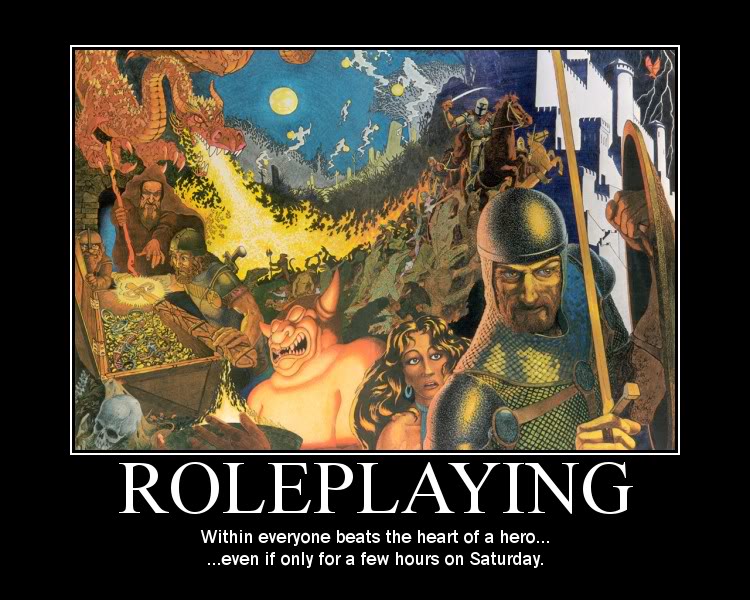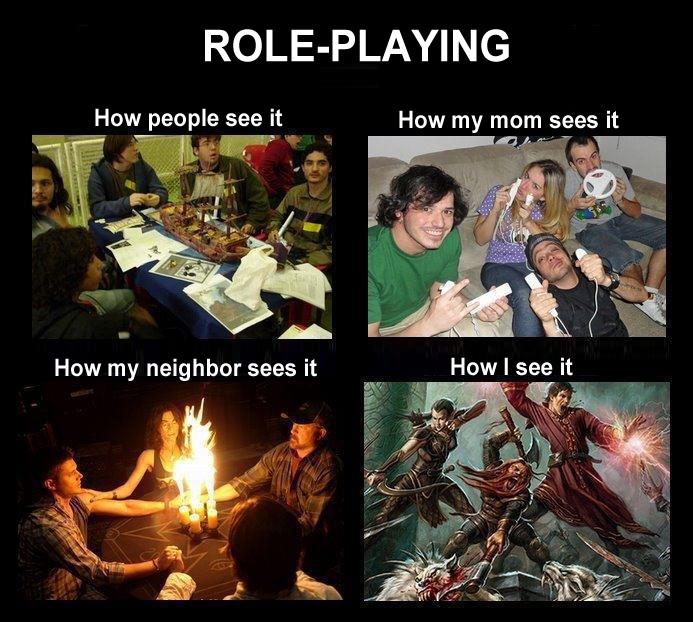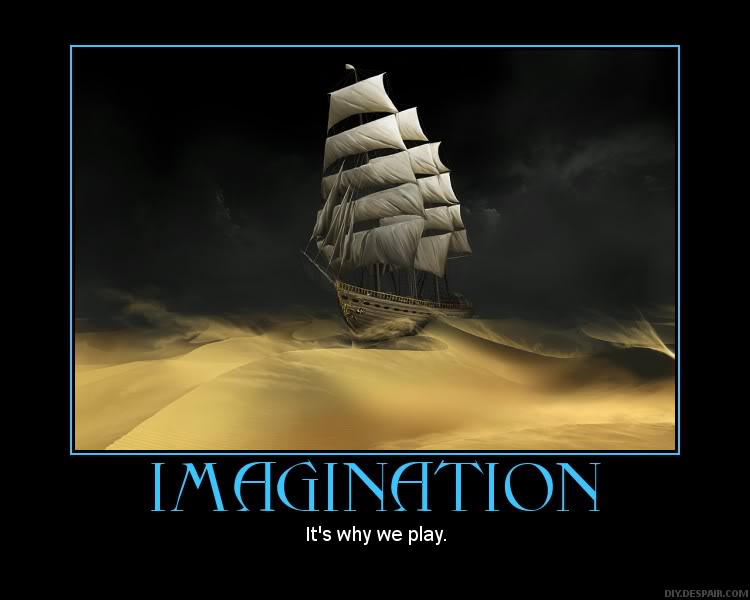User Tools
Sidebar

This was first published at Ricochet in September 2015
About 8 years ago, I sat in an auditorium with the rest of our company on Staff Appreciation Day. I forget who our morning Keynote speaker was, but he asked a fascinating question:
“Who here feels they are as creative now as they were when they were a child?”
In a room of over 500 people, I was one of around 5 or 6 who raised their hands. So around 1% of us felt we still had the same level of creativity we did as children. At lunch, people came up to me to say “Bryan, when he asked that question, I thought of you, because you do those games.” I was flattered to have others confirm what I knew, that I was still as creative as I was in childhood. 8 years later, I still think that today.
For a lot of people, Role Playing Games (RPGs) are “those games” or “like Dungeons and Dragons?” People have a poor understanding of what they are all about. Since this is the first in this series in September, I am going to start with explaining them. And my first clarification is that I am talking about what are called “pen and paper” role playing games. While there are currently RPG computer games, these are not nearly as flexible as the pen and paper games. That is not to put them down, but they are limited with the lack of a Game Master.
A Role Playing Game lets the player build a character in a fictional setting. The setting can be anything, from fantasy, to science fiction, to modern day. Imagine your favorite TV show or movie or book. Now, imagine if you were in control of your favorite character’s decisions. What if you could change the outcome of the story with your actions? That could be pretty cool, right? That is the essence of the Role Playing Game.
There are many flavors of RPG’s on the market. The Granddaddy of them all is the best known, Dungeons and Dragons, first published in 1974. It was a home rules adaption of a war-game called Chain Mail. In a war-game, you control units. In a Role Playing Game you control characters, and that was the great difference.

How each game works is different, based on the system built to manage it. Some systems are more complex than others. The goal of each is to support the play. Let me lay it out.
Usually, a role playing group is composed of 4-7 players and one Game Master (GM). The Game Master is “in charge” of the game. He or she (yes girls and women play these games, though hereafter I am going to stick with “he” for brevity’s sake), sets up the story, controls the Non-Player Characters (NPCs) and enforces the rules of the game. It is his job to “host” the game.
The players are generally in charge of 1, or sometimes 2 characters. These Player Characters (PCs) are described with various characteristics, traits and abilities. Almost always there is some variation of Strength, Intelligence, Dexterity and Charisma. Often there are others, plus some version of abilities or skills. For instance, Aragorn from Lord of the Rings has a decent Strength, high Intelligence, a good Dexterity and very high Charisma. Legalos is not as strong, but has a very high dexterity. Aragorn is great with swords, while Legalos is the man with a bow.
However, a character is also defined by who he is. While the numbers on the sheet are an important short hand for what the character can do, his personality is brought by the Player. One of the greatest joys of role playing is around getting to bring the role to life. Unlike an online game, where class, skills and equipment tell the whole story, a pen and paper RPG offers the opportunity to make your character unique.
How the points on the page are used is important, however. For instance, a John is playing the PC Corbin Street, super spy. Corbin is skilled at driving. While fleeing in a car from the agents of G.H.O.S.T., he tries to jump a river. The GM askes John to roll Corbin’s driving skill. John does, and is successful, and Corbin makes the jump. Had he failed, the GM would have rolled to see the damage to the car. Maybe Corbin would have been captured, and the game session would have gone in a different path.
Each game session is much like an episode of a TV program. The GM usually sets the stage; he gives details to the players. The players respond to the information and act. Most systems use dice to introduce a random element into actions. Depending on the game, or the moment, they can be used more or less. The sessions usually last 3-5 hours. The overall story often takes more than one session, just like a modern TV show, which will have a story over several episodes or a season. This group of characters, in their stories are called a campaign, which is much like the TV show itself. I find it easy to think of each story arc in the campaign as a “season”.

So, to use something current, let’s look at a show like Burn Notice as if it were a game. Burn Notice starts as a small group, with 3 players running 3 of the 4 main characters:
Michael Westen, Fiona Glenanne, and Sam Axe. Each has some overlapping skills, but they have different abilities for situations. While someone might play Michael’s mom, Mattie Westen, she more has the feel of a Non-Player Character who is either an ally, or some sort of dependent NPC for Michael.
The Campaign is centered about Michael’s Burn Notice and his quest to get “his life back”. The setting is Miami present day, in world of intrigue, rouge CIA operations, and evil men and women preying on the good citizens of Miami.
In seasons 1-6, each week, there is a season long story, which is the “B” plot. Michael and his friends make some progress on this story. Each week there is also the “A” plot, where Michael and company solve a problem for someone. Various NPC’s come and go, that both support the team, and those that are the adversaries.
So, in a typical episode, Michael has a plan to dig into the mystery of why he got burned, such as wanting to get his hands on a CIA file. Getting in the way of that is a Charity Doctor’s clinic that is being squeezed by local criminals for money. By the end of the episode the group has moved closer to getting the file and they have stopped the gang, and everyone drinks Mojitos.
As a game, this would be a session, with the GM sending a NPC to the characters to ask for help. The players would plan a way to help the NPC, while also keeping in motion their overall plan. For action scenes, the Players and GM would use dice to determine the outcome of who shot whom and how bad.

It is a blast. Unlike a TV show, there is not a script. Sometimes the Players just do not do what the GM expects. They can solve problems in ways that are totally unexpected. To me the greatest joy of an RPG is that the story is written as a group. I love to GM and my players surprise me. As a Player, I love to surprise the GM.
My second greatest joy is playing a character that is different than me. People asked what power they would want, often say “flight”. Well, in many games, you can play a character who can fly. Or throw fireballs, or pilot a space ship, or read minds. The only limit is your imagination.
When I discovered Dungeons and Dragons I was 11. It was at a church camp where other people were playing. I just sat there and listened. Well, I asked a lot of questions. When I got home, I wanted mom and dad to take me to a store to buy the game in the worst way. I got my first set, and I was hooked.
Soon, I was on to other games. D&D started a new way of playing games, and lots of them were out there. I played a bunch of games as well, like the super hero game, Champions and the Space Opera game, Traveler. My parents bought me the James Bond Game for my birthday when I was 14. As I got older, games got more fun. The joy of running a game of Paranoia, the fear of playing Call of Cthulhu, these are strong memories of high school. My best friend at the time created his own game, Star Chase. We had a lot of fun freeing an Earth in the distant future and keeping it safe from all sorts of attackers. While others were out scoring drinks (and I imagine dates), I gamed.
In college, things were not different, in fact they were better. I was blessed to have a wonderful Game Master in college, who mentored me on what a great GM is supposed to be. And that has had a profound effect on me. He showed me that the most important part of being a good GM is to make sure each Player feels that his Character is special, has his own role to play, and that he gets time in the spotlight.
But that was not the greatest things I got from Role Playing Games. I met my wife, Linda, in one. It was a superhero game, and she was the tag along girlfriend of another player. I was playing a middle aged mentalist (think Professor X), and she was playing a taciturn speedster (think Flash). It was not love at first sight. But, by the end of the school year, we were together.
These days Linda and I still play with an RPG group once a month. It is like hosting a party. The GM rotates as we play different campaigns, usually making a switch after a story has concluded. Being the GM is hard work, so it is nice to take a break. Once Campaign I ran went on and off from 2005 to 2012! One Sunday a month, from 2-6ish, everyone brings snacks, and Linda cooks a dinner, and we have a great time.
Role Playing is a great way to have fun, to stay creative, and explore different ways of being. It is well worth the time and effort. Now, I have to wrap this up and go build a character for an upcoming Pathfinder game Linda is going to be running.

